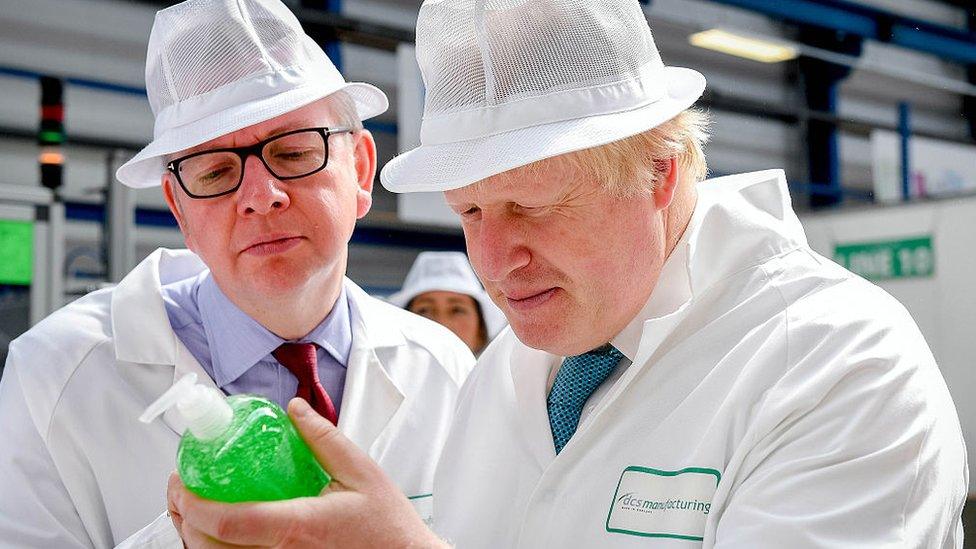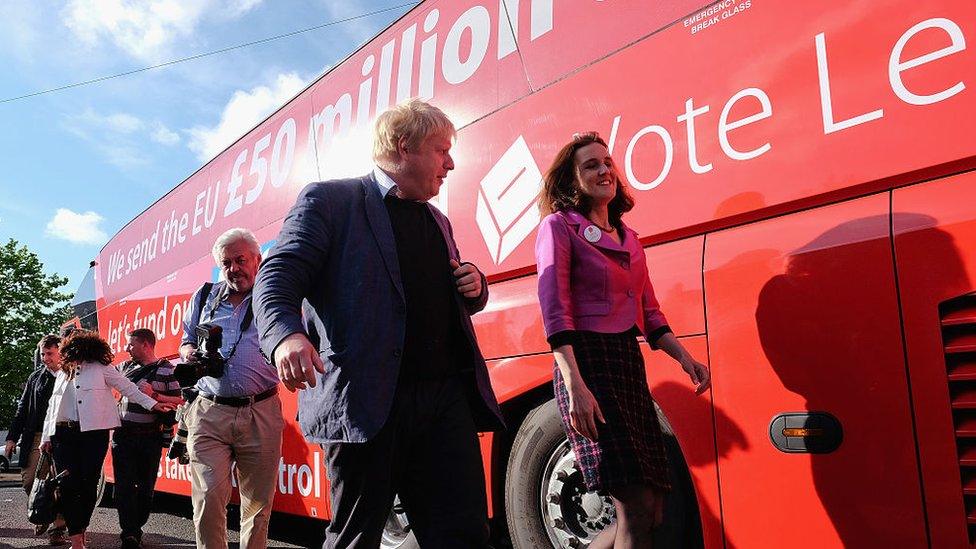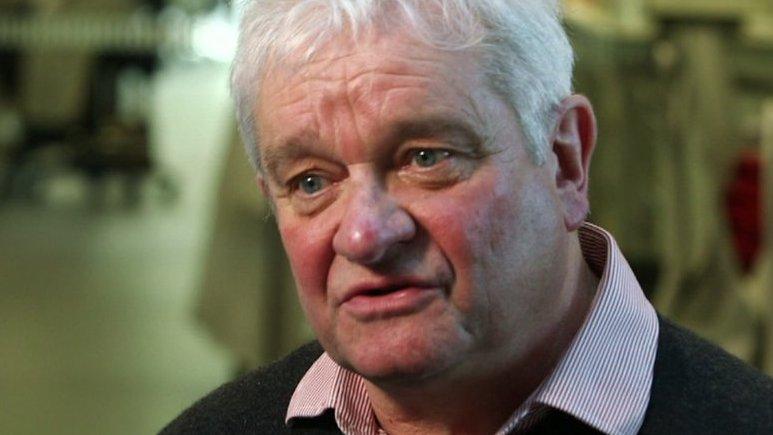Have we fallen out of love with experts?
- Published
Have we lost faith in experts? If so, what are the implications? Ian Katz reports
In the last days before the referendum, Newsnight's Policy Editor Chris Cook interviewed a retired woman called Joan in a Bognor Regis cafe.
In what felt like one of the most revealing exchanges of the campaign, Chris listed Bank of England governor Mark Carney's seemingly ample qualifications to make predictions about how Brexit would affect the economy.
"Yes," she replied, "but does he know what it's like to go round Sainbury's?, external"
It was a moment that seemed to support Michael Gove's claim that "people in this country have had enough of experts". So did the vote itself - a rejection, among other things of overwhelming expert opinion that Brexit was a bad idea.
And in the months since, the expert bashers have been able to claim a measure of vindication: few of the dire consequences predicted by most economists have materialised.
"Does he know what it's like to go round Sainbury's?" asked Joan in Bognor Regis
But what is the truth about our relationship with "experts"? In the context of Trump's America, where every fact has become contestable, and once revered authorities are dismissed as partisan and untrustworthy, it's a question that suddenly seems rather important.
Was Gove really right that we have ceased to believe that people with years of accumulated specialist knowledge and qualifications are worth listening to? And if so does our newfound scepticism apply to particular kinds of expert, or to all of them?
You don't need letters after your own name to appreciate the potential implications: in a world where experts cannot command public trust, how can they convince us that action must be taken on climate change? Or that vaccinations are safe? Or that a particular foreign state poses a threat to us?
Michael Gove now claims that he was really talking about economists when he made his infamous comment in an interview with Sky's Faisal Islam, external.
He says Islam interrupted him before he could clarify. Having got it wrong over Britain entering the euro, the 2008 crash, and the immediate impacts of a Brexit vote, he says economics is now "a profession in crisis".

Michael Gove and Boris Johnson were key figures in the Vote Leave campaign
Certainly economic forecasting has always been a rather hit or miss business. JK Galbraith said its only function was "to make astrology look respectable", external.
Many economists now admit they got the short term impacts of a Brexit vote wrong. Essentially they misjudged how consumers would behave amid the uncertainty created by a vote to leave: they thought we'd tighten our belts and save; instead we went on a borrowing and spending binge.
But most also point out that it's far too early to judge the accuracy of their forecasts. Britain hasn't even left the EU yet; it will take years to judge whether their predictions of reduced growth were right.
As one senior economist put it to me: "Gove is right that economics is a profession in crisis but it has nothing to do with Brexit predictions. The real crisis is our failure to explain the collapse in productivity."
Perhaps the bigger question is whether the scepticism Gove says he meant to direct at economists has now spread to other forms of expert.
Experts "are being derided and pushed back" argues Sir Paul Nurse
Sir Paul Nurse, the Nobel prize-winning geneticist and director of London's new cathedral to science, the Francis Crick Institute, fears it has.
"Unfortunately Mr Gove's remarks spilled over into all sorts of other areas where experts have an enormous contribution to make to the proper running of society," he told me.
"The fact that experts have been derided in this way does have an effect in undermining science and scientific evidence.
Gove himself acknowledges his remark may have had unintended consequences.
"I'm sure that there are people who've latched onto that word… who think that I may have legitimised it, and it may be that there are some people out there who think that that I'm giving them licence to operate in that way. Who knows?"
Michael Gove says his remarks on experts were taken out of context
But for some, like the science writer Matt Ridley, greater public scepticism about all kinds of expert can only be a good thing. Far from the assault on Enlightenment values that some fear, the backlash against experts, he says, is quite the reverse.
"One has to remember that the Enlightenment did consist of challenging the experts, particularly challenging priests and saying you don't have all the answers, People can work out the answers for themselves. There's no reason we can't use rationalism to arrive at solutions to problems, and to the extent that we're challenging a priesthood today and saying, 'No hang on you might be wrong.' That's healthy."
But it begs the question: where does the challenging stop?
Can ordinary people without scientific training really be expected to make up their own minds up about whether vaccines, for instance, are safe?
Ridley concedes that we can't all wade through the scientific literature: "We have to rely on other people to do that for us."
And who are those other people? "People who've done more work in looking into the evidence." In other words, people who sound quite a lot like experts.
In fact the hard evidence that Britain has fallen out of love with experts is thin on the ground. There is no shortage of data pointing to falling levels of trust in institutions - the latest Edelman Trust Barometer, external, an annual survey of trust across 28 countries, found the steepest drop in trust of government, business, media and NGOs in its 17 year history.
But asked in an Institute for Government poll (if we still pay any attention to those) whether politicians making difficult decisions should consult experts, more than 80% of both Remain and Leave voters said they should.

Many facts were contested during the EU referendum campaign
And during the referendum campaign, a poll by Ipsos MORI found that academics came in just behind friends and family when people were asked whose views they would trust about Brexit.
As the philosopher Onora O'Neill put it: "Some of the British public may be sick of experts, but I don't think most of them are. You don't take your shoes to the garage to be mended and you don't go to have your appendix out in your local chemist."
In truth, it seems there is not so much a crisis of trust in experts, as a profound scepticism about their - or anyone else's - ability to predict the future.
Most economists, like meteorologists, take care to attach probabilities to their predictions, and to spell out the assumptions behind them. But in the heat of a campaign like the referendum, those nuances are often stripped away by politicians, or the media, or both.
And it is the seeming certainty and precision of some of these predictions that seems to breed public suspicion.
As Bertrand Russell put it: "The whole problem of the world is that fools and fanatics are always so certain of themselves, but wiser people so full of doubts."
Ian Katz is editor of BBC Newsnight. You can follow him on Twitter, external and follow Newsnight on Facebook, external, Twitter, external and YouTube, external
- Published27 February 2017
